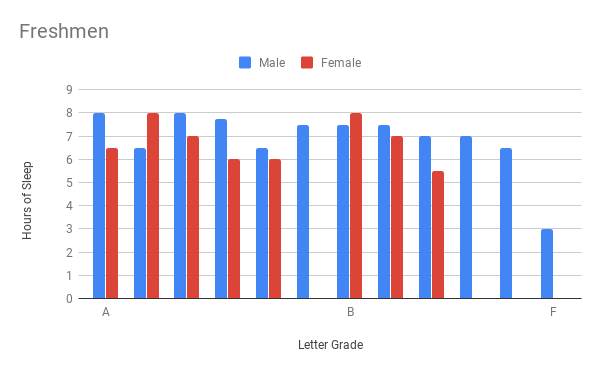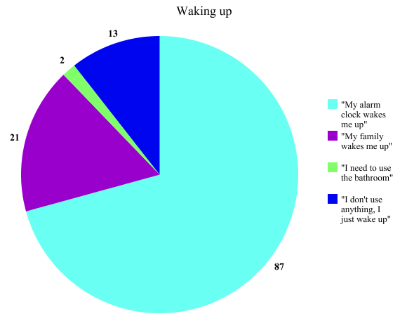Don’t sleep on this: How sleep levels impact the lives of teens

Daydreaming, Lower levels of sleep can be detrimental to a teen’s emotional, cognitive, and physical health – brain activity is proven to lessen with less sleep. Students have often bragged about how little sleep they received the night before, often times without knowing the dangerous effects.
May 16, 2019
Students crowd the halls, mindlessly wandering. Heavy eyelids and intermittent yawns remind them of their once cozy beds. The morning bell alerts them, slightly waking up their systems as they shuffle along to their classes, comparable to a hoard of zombies. There is a common factor within this scenario: sleep, or the lack thereof.
Before finding the causes and effects of the lack of sleep, it is important to understand all aspects of sleep. The control center of the body, the brain, controls not only how we move or think but also how we sleep and dream.
Common belief states that there are two stages of sleep: Deep sleep and REM (Rapid Eye Movement) sleep. However, there are three known stages of sleep alongside REM sleep.
Stage 1 Non-REM Sleep: The transition from being awake to falling asleep. During this short period of relatively light sleep, the body slows down its heartbeat, breathing, and eye movements. Muscles also relax and brain waves slow.
Stage 2 Non-REM Sleep: The stage before entering deeper sleep. Muscles relax even further, body temperature drops and eye movements stop. Brain wave activity continues to slow but has brief electrical activity. This is the sleep stage that occurs more often.
REM Sleep: Occurs about 90 minutes after falling asleep. Your eyes move rapidly from side to side behind closed eyelids. Mixed frequency brain wave activity becomes closer to that seen while being awake. The body’s cardiac and respiratory activity changes to resemble what occurs during wakefulness. Dreaming occurs during REM sleep, although some can also occur in non-REM sleep. This is also the stage where sleep paralysis may occur.
Stage 3 Non-REM Sleep: The period of deep sleep that you need to feel refreshed in the morning. It occurs in longer periods during the first half of the night. Your heartbeat and breathing slow to their lowest levels during sleep. Your muscles relax and it may be difficult to awaken you. Brain waves become even slower.

CBS News claims that there are common sleeping myths that people believe. Acting on these beliefs can create a negative impact on health.
Myth 1: People only need 5 hours of sleep
Students should sleep at least 7 hours per night according to sleep specialists and the U.S. Centers for Disease Control and Prevention. The lack of sleep has been linked to a number of diseases, including diabetes, obesity, depression and anxiety.
Myth 2: Sleep is sleep, it doesn’t matter when you do it
Studies of night shift workers show they report less sleep and lower sleep quality than daytime workers. Night shift workers are also at a higher risk for long-term health issues like depression, diabetes, and cancer.
Myth 3: You can adapt to function just as well with less sleep
While many people may believe that they can learn to adapt to less sleep, the researchers found this to be false. Instead, studies show that even after weeks of tracking, less sleep leads to a decrease in productivity and awareness during the daytime.
According to a health survey administered at UGA, 1 in 4 UGA students indicate that lack of sleep has an impact on their academic performance in a negative way. They are found to receive lower grades, miss paper or project deadlines, or withdraw from classes. Some students rely on staying up most of the night to study, but pulling an all-nighter and cramming at the last minute can actually be counterproductive. If one does not get enough sleep, the brain cannot process, retain, or remember things as well as they would if they had the optimal amount of sleep.
The Bird Feed gave a survey asking students about how sleep affects their lives and received a little over 120 responses. The responses given are shown as data in the multiple graphs and charts used within this article. The charts below depict that lower letter grades may be associated with lower amounts of sleep. Students will often pull “all-nighters” in order to complete the homework they could not complete in school. Most students also have jobs or extracurricular activities that prevent them from doing school-related work until late into the night.
“I think it is important to get eight to ten hours of sleep each night. I, however, do not get this much sleep. Usually I get about six to seven hours of sleep or less. This is because I spend a lot of time at work, so keeping up with homework and sleep is difficult,” says senior Pierce Wirsig.
As seen in the charts below, there is a slight trend between letter grades and hours of sleep. While it is true that students can accomplish more assignments by staying up all night, the data given by students shows that lack of sleep can affect a student’s overall classroom success.
Along with school, studying, and completing homework, many student have jobs or participate in extracurricular activities. Athletes stay up till odd hours of the night, wake up, and arrive at school hours before the rest of the students. Students with jobs may have similar schedules. It seems to be a cycle of work, school, extracurricular activities, then homework. This cycle leaves many students skipping slip in order to get everything done. As seen in the chart below, students with extracurricular activities state that if they did not have these activities, they may get more sleep. Many students claim that they would get the same amount of sleep. However, with a current average of six hours of sleep a night, this is not an impressive factor.
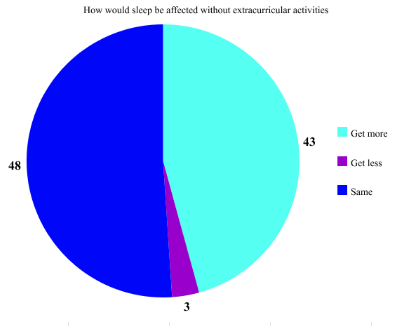
“I think having a job is worth the lack of sleep because it is a necessary activity so you can afford a place to sleep,” says senior Colin Schmidt.
Along with not being able to maintain a healthy amount of sleep, teens often unknowingly do other things that negatively impact their health and sleep. It is important to maintain a regular sleep schedule, going to bed and waking up at about the same time each day. Oversleeping over the weekends can make waking up for school an even more difficult task. Taking a nap in the early afternoon for twenty minutes can be beneficial and rejuvenate the body. Many students use their phones before going to bed, as seen in the chart below. Seventy-two percent of students use their phone minutes before going to bed as opposed to only fifteen percent turning off their electronics and hour or more before bed. Drinking caffeine will also negatively impact sleep levels, especially with sixty-seven percent of students drinking some kind of caffeinated drink. As seen in the chart below, most students use their phones before bed and drink caffeine, factors that can be detrimental to sleep levels. Shown in the chart entitled “Waking Up”, most students rely on their alarm clocks to wake them up. While that tool is useful, there is a flaw within it: the “snooze button”. Students will sleep through multiple alarms, learning how to hit the button in their sleep. It may be a good idea to put that alarm on the opposite side of the room, forcing students to get up in order to turn it off.
“To function optimally, your body clock needs regularity,” says Dr. Ann Romaker, Associate Professor in the Department of Internal Medicine at the UC College of Medicine, and Director of the University of Cincinnati Sleep Medicine Center. “There are clock genes in every organ, and they need to remain coordinated for the immune system, hormonal systems, heart, lungs, brain, etc. to function optimally and to repair damage from the preceding wake period.”
The Center for Sleep and Circadian Neurobiology found that the anatomical regions linked to sleep quality are also linked to the production of serotonin – a neurotransmitter associated with feelings of happiness and serenity. Theories state that serotonin helps promote deeper and more restful sleep. Out of the 200 students surveyed, only twelve admitted to taking prescribed antidepressants. Serotonin – the lack of it – is a key component of depression. Antidepressants aid in normalizing levels of serotonin. The National Center for Biotechnology Information discusses how depression often goes undiagnosed. With undiagnosed and diagnosed students with depression, low levels of seratonin can attribute to the low levels of sleep. It has been hypothesized that about 90% of patients with depression complain about sleep quality. As seen in the chart, most students who take antidepressants get a healthy amount of sleep. From this it is inferred that students with normalized levels of serotonin may sleep better than those without. If students display signs of depression, it may be a good idea to see a psychiatrist.
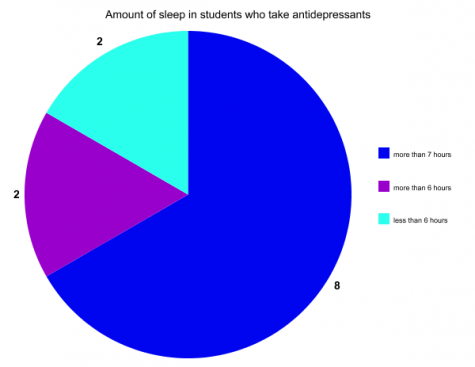
“Lack of sleep causes me to be irritable and causes me to have a hard time concentrating,” says senior Rachel Champagne.
Staying up all night to do homework, jobs, and extracurricular activities, it is no wonder that students feel exhausted during the day. As can be seen in the chart, 43.9% of students surveyed find the lack of sleep a little problematic in class. 8.1% found it more than a big problem. Overall, 83.7% of students find the lack of sleep problematic. From this, it is hypothesized that the lack of sleep can negatively impact students both mentally and physically.
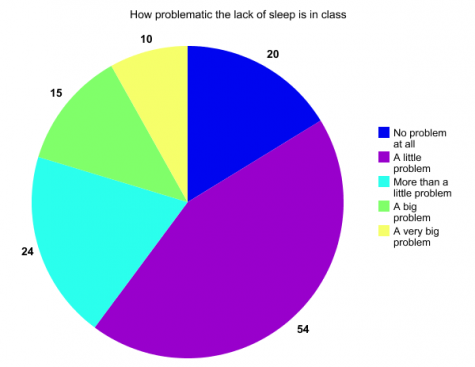
Sleep deprivation can compare to drunkenness, 17 to 19 consecutive hours of being awake reduces cognitive functioning to the same extent as a blood alcohol concentration of 0.05. More dangerously, people who are sleep deprived have the same driving ability as people who drive drunk. Harvard Business Review states that sleep deprivation is a public hazard, rather than being an individual health hazard. In a study their research team conducted of hospital interns who had been scheduled to work for at least 24 consecutive hours were found that their odds of stabbing themselves with a needle or scalpel increases by 61%, their risk of crashing a motor vehicle increases by 168%, and their risk of a near miss increases by 460%. Not only is sleep deprivation has a harmful to metabolic rates, but it may increase the likelihood of chronic disorders. Students who do not get the recommended amount of sleep for their age are at risk for disorders such as diabetes, obesity, poor mental health, attention/behavioral problems and decreased academic involvement.
The results of the survey suggest that the majority of SFHS students do not get adequate amounts of sleep. This means that all of the detrimental symptoms listed above may begin – or have begun – applying to them. It is a good idea to turn off electronics, do homework beforehand, and get the proper amount of sleep. Through this, the livelihood and academic standing of students will increase by a copious amount.


